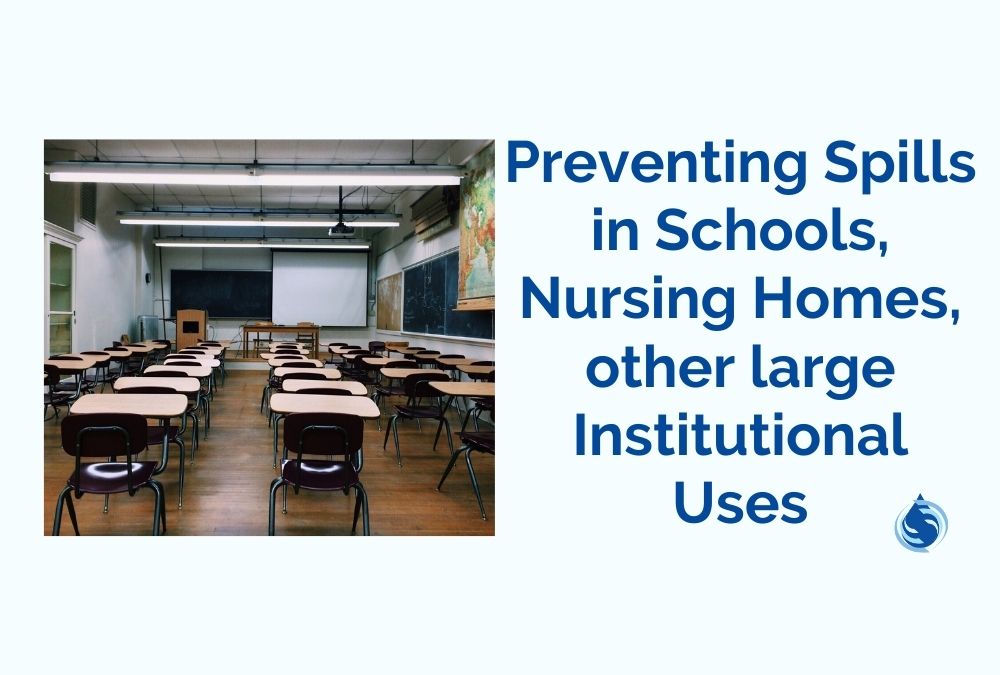HOW DO PREVENTING SPILLS AFFECT ME IN THE SCHOOL, NURSING HOME, OR OTHER LARGE INSTITUTIONAL USE BUSINESS?
- Changes to Indianapolis zoning codes and Marion County health ordinances will likely affect your business operations by mandating certain Best Management Practices (BMPs) that were previously voluntary.
- If you are careful to contain your contaminants, you will avoid polluting your site, or environs and avoid a potentially expensive clean-up down the road.
- Being a good neighbor in your wellfield is good for your business – it will be appreciated by your customers.

WHY SHOULD I CARE ABOUT A WELLFIELD?
For many years we believed that our groundwater was protected from contamination by being underground. We now know that substances on the surface can seep down and contaminate our drinking water supply. As Central Indiana grows the only source of additional water will be the groundwater resources.
WHAT ARE POTENTIAL CONTAMINANTS?
Any chemical used as part of your operations could contaminate groundwater if handled, stored, or disposed of in an incorrect manner. Potential contaminants are generally chemicals used as a part of landscaping operations such as herbicides or pesticides, fuel for lawnmowers, tractors, or other vehicles, chemicals used for cleaning or disinfection, back-up generators. Within schools, chemicals used as part of science laboratories or as part of art classes can also be potential contaminants to groundwater. Within nursing homes and other medical facilities, medical waste and chemicals used as treatments may also potential contaminant groundwater if stored or handled incorrectly.
WHAT CAN I DO AT MY FACILITY TO HELP PROTECT GROUNDWATER?
Schools
- Appropriately store landscaping chemicals, equipment, and fuel. All liquids or water soluble chemcials should be stored indoors on a floor free of cracks, preferably in secondary containment. Any easy way to provide secondary containment for small quantities of chemicals is to store them within a plastic storage tote (such as a Rubbermaid tote).
- Develop a chemical management program to improve your chemical management practices. The Indiana Department of Environmental Management (IDEM) provides a Green Steps for Schools Toolkit. The United States Environmental Protection Agency provides a Toolkit for Safe Chemical Management.
- When possible use ecofriendly cleaners and disinfectants.
- In art classes and studios, try to reduce the amount of chemicals stored and switch to ecofriendly products when possible.
Nursing Homes
- Appropriately store landscaping chemicals, equipment, and fuel. All liquids or water soluble chemicals should be stored indoors on a floor free of cracks, preferably in secondary containment. Any easy way to provide secondary containment for small quantities of chemicals is to store them within a plastic storage tote (such as a Rubbermaid tote).
- When possible use ecofriendly cleaners and disinfectants.
- Try to reduce the amount of textiles requiring laundering and use eco-friendly products when possible.
- Appropriately manage and store chemicals and medical waste.
Other Institutional Uses
Please contact us and describe the processes at your facility and we can provide recommendations.
EDUCATION AND TRAINING
There are many resources and face-to-face help to assist you in being compliant. Here’s what you can do:
- Review our resource page for helpful videos, websites, and signs for your business.
- Contact us for a Wellfield Review or help on developing your spill plan.
